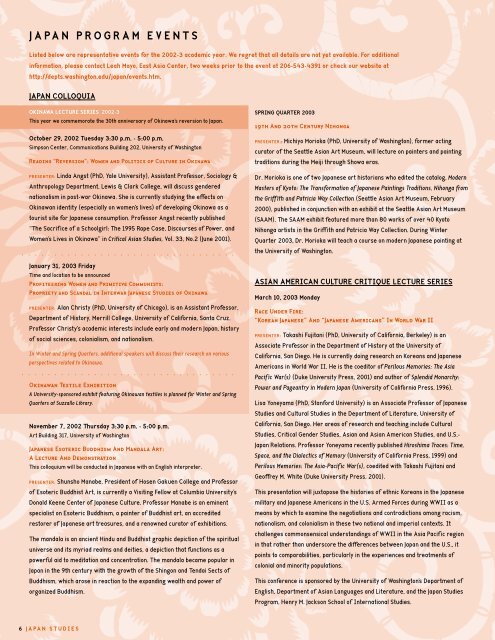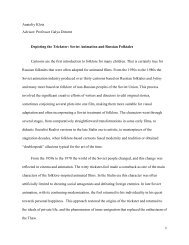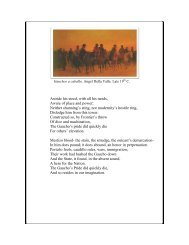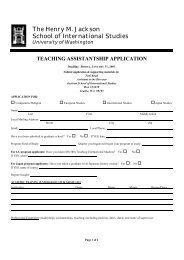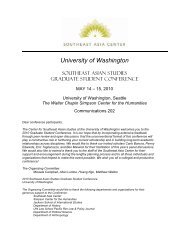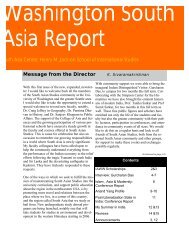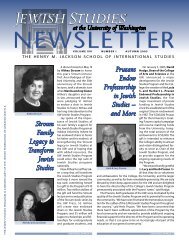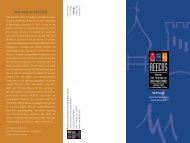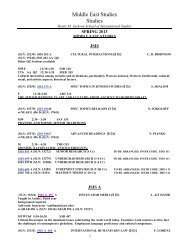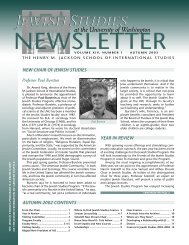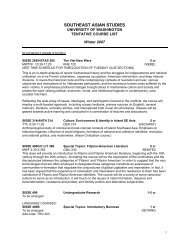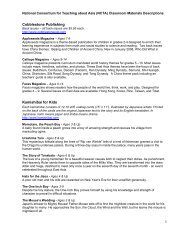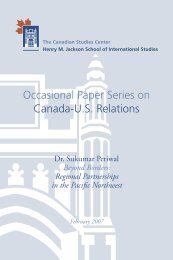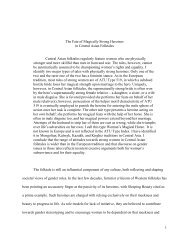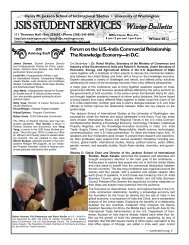FROM THE CHAIR - Jackson School of International Studies ...
FROM THE CHAIR - Jackson School of International Studies ...
FROM THE CHAIR - Jackson School of International Studies ...
You also want an ePaper? Increase the reach of your titles
YUMPU automatically turns print PDFs into web optimized ePapers that Google loves.
JAPAN PROGRAM EVENTS<br />
Listed below are representative events for the 2002-3 academic year. We regret that all details are not yet available. For additional<br />
information, please contact Leah Mayo, East Asia Center, two weeks prior to the event at 206-543-4391 or check our website at<br />
http://depts.washington.edu/japan/events.htm.<br />
JAPAN COLLOQUIA<br />
OKINAWA LECTURE SERIES 2002-3<br />
This year we commemorate the 30th anniversary <strong>of</strong> Okinawa’s reversion to Japan.<br />
October 29, 2002 Tuesday 3:30 p.m. - 5:00 p.m.<br />
Simpson Center, Communications Building 202, University <strong>of</strong> Washington<br />
Reading “Reversion”: Women and Politics <strong>of</strong> Culture in Okinawa<br />
PRESENTER: Linda Angst (PhD, Yale University), Assistant Pr<strong>of</strong>essor, Sociology &<br />
Anthropology Department, Lewis & Clark College, will discuss gendered<br />
nationalism in post-war Okinawa. She is currently studying the effects on<br />
Okinawan identity (especially on women’s lives) <strong>of</strong> developing Okinawa as a<br />
tourist site for Japanese consumption. Pr<strong>of</strong>essor Angst recently published<br />
“The Sacrif ice <strong>of</strong> a <strong>School</strong>girl: The 1995 Rape Case, Discourses <strong>of</strong> Power, and<br />
Women’s Lives in Okinawa” in Critical Asian <strong>Studies</strong>, Vol. 33, No.2 (June 2001).<br />
○ ○ ○ ○ ○ ○ ○ ○ ○ ○ ○ ○ ○ ○ ○ ○ ○ ○ ○ ○ ○ ○ ○ ○ ○ ○ ○ ○ ○ ○ ○ ○ ○<br />
January 31, 2003 Friday<br />
Time and location to be announced<br />
Pr<strong>of</strong>iteering Women and Primitive Communists:<br />
Propriety and Scandal in Interwar Japanese <strong>Studies</strong> <strong>of</strong> Okinawa<br />
PRESENTER: Alan Christy (PhD, University <strong>of</strong> Chicago), is an Assistant Pr<strong>of</strong>essor,<br />
Department <strong>of</strong> History, Merrill College, University <strong>of</strong> California, Santa Cruz.<br />
Pr<strong>of</strong>essor Christy’s academic interests include early and modern Japan, history<br />
<strong>of</strong> social sciences, colonialism, and nationalism.<br />
In Winter and Spring Quarters, additional speakers will discuss their research on various<br />
perspectives related to Okinawa.<br />
○ ○ ○ ○ ○ ○ ○ ○ ○ ○ ○ ○ ○ ○ ○ ○ ○ ○ ○ ○ ○ ○ ○ ○ ○ ○ ○ ○ ○ ○ ○ ○ ○<br />
Okinawan Textile Exhibition<br />
A University-sponsored exhibit featuring Okinawan textiles is planned for Winter and Spring<br />
Quarters at Suzzallo Library.<br />
November 7, 2002 Thursday 3:30 p.m. - 5:00 p.m.<br />
Art Building 317, University <strong>of</strong> Washington<br />
Japanese Esoteric Buddhism And Mandala Art:<br />
A Lecture And Demonstration<br />
This colloquium will be conducted in Japanese with an English interpreter.<br />
PRESENTER: Shunsho Manabe, President <strong>of</strong> Hosen Gakuen College and Pr<strong>of</strong>essor<br />
<strong>of</strong> Esoteric Buddhist Art, is currently a Visiting Fellow at Columbia University’s<br />
Donald Keene Center <strong>of</strong> Japanese Culture. Pr<strong>of</strong>essor Manabe is an eminent<br />
specialist on Esoteric Buddhism, a painter <strong>of</strong> Buddhist art, an accredited<br />
restorer <strong>of</strong> Japanese art treasures, and a renowned curator <strong>of</strong> exhibitions.<br />
The mandala is an ancient Hindu and Buddhist graphic depiction <strong>of</strong> the spiritual<br />
universe and its myriad realms and deities, a depiction that functions as a<br />
powerful aid to meditation and concentration. The mandala became popular in<br />
Japan in the 9th century with the growth <strong>of</strong> the Shingon and Tendai Sects <strong>of</strong><br />
Buddhism, which arose in reaction to the expanding wealth and power <strong>of</strong><br />
organized Buddhism.<br />
6 JAPAN STUDIES<br />
SPRING QUARTER 2003<br />
19th And 20th Century Nihonga<br />
PRESENTER:: Michiyo Morioka (PhD, University <strong>of</strong> Washington), former acting<br />
curator <strong>of</strong> the Seattle Asian Art Museum, will lecture on painters and painting<br />
traditions during the Meiji through Showa eras.<br />
Dr. Morioka is one <strong>of</strong> two Japanese art historians who edited the catalog, Modern<br />
Masters <strong>of</strong> Kyoto: The Transformation <strong>of</strong> Japanese Paintings Traditions, Nihonga from<br />
the Griff ith and Patricia Way Collection (Seattle Asian Art Museum, February<br />
2000), published in conjunction with an exhibit at the Seattle Asian Art Museum<br />
(SAAM). The SAAM exhibit featured more than 80 works <strong>of</strong> over 40 Kyoto<br />
Nihonga artists in the Griff ith and Patricia Way Collection. During Winter<br />
Quarter 2003, Dr. Morioka will teach a course on modern Japanese painting at<br />
the University <strong>of</strong> Washington.<br />
ASIAN AMERICAN CULTURE CRITIQUE LECTURE SERIES<br />
March 10, 2003 Monday<br />
Race Under Fire:<br />
“Korean Japanese” And “Japanese Americans” In World War II<br />
PRESENTER: Takashi Fujitani (PhD, University <strong>of</strong> California, Berkeley) is an<br />
Associate Pr<strong>of</strong>essor in the Department <strong>of</strong> History at the University <strong>of</strong><br />
California, San Diego. He is currently doing research on Koreans and Japanese<br />
Americans in World War II. He is the coeditor <strong>of</strong> Perilous Memories: The Asia<br />
Pacif ic War(s) (Duke University Press, 2001) and author <strong>of</strong> Splendid Monarchy:<br />
Power and Pageantry in Modern Japan (University <strong>of</strong> California Press, 1996).<br />
Lisa Yoneyama (PhD, Stanford University) is an Associate Pr<strong>of</strong>essor <strong>of</strong> Japanese<br />
<strong>Studies</strong> and Cultural <strong>Studies</strong> in the Department <strong>of</strong> Literature, University <strong>of</strong><br />
California, San Diego. Her areas <strong>of</strong> research and teaching include Cultural<br />
<strong>Studies</strong>, Critical Gender <strong>Studies</strong>, Asian and Asian American <strong>Studies</strong>, and U.S.-<br />
Japan Relations. Pr<strong>of</strong>essor Yoneyama recently published Hiroshima Traces: Time,<br />
Space, and the Dialectics <strong>of</strong> Memory (University <strong>of</strong> California Press, 1999) and<br />
Perilous Memories: The Asia-Pacif ic War(s), coedited with Takashi Fujitani and<br />
Ge<strong>of</strong>frey M. White (Duke University Press, 2001).<br />
This presentation will juxtapose the histories <strong>of</strong> ethnic Koreans in the Japanese<br />
military and Japanese Americans in the U.S. Armed Forces during WWII as a<br />
means by which to examine the negotiations and contradictions among racism,<br />
nationalism, and colonialism in these two national and imperial contexts. It<br />
challenges commonsensical understandings <strong>of</strong> WWII in the Asia Pacif ic region<br />
in that rather than underscore the differences between Japan and the U.S., it<br />
points to comparabilities, particularly in the experiences and treatments <strong>of</strong><br />
colonial and minority populations.<br />
This conference is sponsored by the University <strong>of</strong> Washington’s Department <strong>of</strong><br />
English, Department <strong>of</strong> Asian Languages and Literature, and the Japan <strong>Studies</strong><br />
Program, Henry M. <strong>Jackson</strong> <strong>School</strong> <strong>of</strong> <strong>International</strong> <strong>Studies</strong>.


